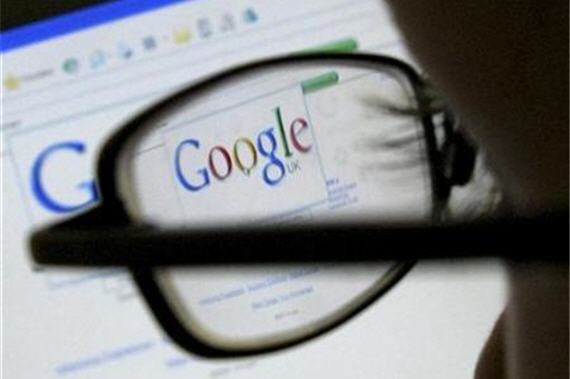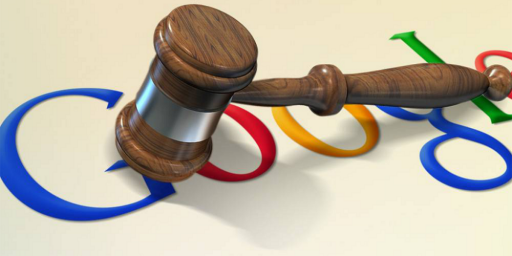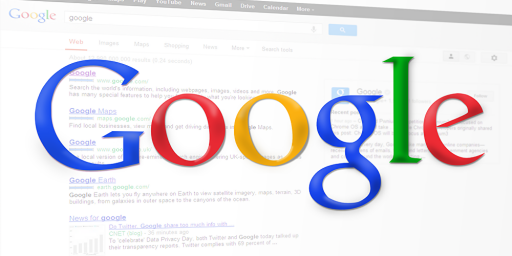Google Being Sued To Remove Search Results
An odd lawsuit out of France.
A lawsuit in France is asking Google to do what seems to be virtually impossible, remove something from the Internet:
PARIS — Max Mosley, the former president of the International Automobile Federation, might be forgiven for wanting Google to filter certain search results.
Mr. Mosley was the victim of a spectacular 2008 sting by News of the World — Rupert Murdoch’s disgraced, and now defunct, tabloid weekly — which posted photos and video of him participating in a sadomasochistic sex party that the paper described as “a sick Nazi orgy with hookers.”
The Nazi claim, in particular, was a bitter one; the son of Sir Oswald Mosley, a pre-World War II-era British fascist, Max Mosley has long bristled at the suggestion of Nazi sympathies. He sued News of the World in a London court for breach of privacy and was awarded £60,000, or about $94,000, in damages.
The High Court ruled that there was “no evidence” that the sex party had been “intended to be an enactment of Nazi behavior or adoption of any of its attitudes.” It also found that there had been “no public interest or other justification for the clandestine recording.”
“The court ordered News of the World to remove the material in question from its Web site, naturally, and there the story might have ended. Except, of course, that the photos and video continue to live on the Internet, via social media and on Web sites maintained by individuals. Mr. Mosley has been fighting ever since to make them disappear.
And that is where Google comes in: Mr. Mosley asked a Paris court during the past week to order the Internet giant to create an algorithm to filter all such photos from its service and search engine, now and forever. His lawyer told the court, the Tribunal de Grande Instance, that if Google France refused to remove the offending images it should face fines.
The French court said it would issue a ruling on Oct. 21. Mr. Mosley has filed a similar case in Hamburg that is to be heard this month.
Google strongly denies that it has any responsibility in the matter.
“We sympathize with Mr. Mosley’s situation,” Google said in a statement, noting that it had always honored his requests to remove links to material that obviously violated the High Court order. “But his proposal to filter the Web would censor legitimate speech, restrict access to information, and stifle innovation.”
Google noted that there was already a solution to the problem: “Going after the actual publishers of the material, and working with Google through our existing and effective removals process.”
Google says that it has already taken down ”hundreds of pages” with images that obviously violate the court ruling, when Mr. Mosley has requested that it do so, but that there are many cases in which it is not immediately clear whether the content is affected by the ruling, and that in those cases a judge or other competent official should make the decision. And the company said it has never created such a filter on behalf of one person.
It cites French and E.U. law, which do not require search engines to comb the Web for unlawful content, and argues that, in any case, many hits the photos receive are driven by communications among individuals, so blocking them on search would not end the problem.
A concurrent case, at the European level, would appear to back Google, though lawyers in the case say it might not be directly relevant. The European Court of Justice, which is based in Luxembourg, is currently examining a Spanish man’s claim of a “right to be forgotten” on the Web — something Silicon Valley companies oppose.
In a sign that the case might be swinging the technology giants’ way, Niilo Jaaskinen, the Finnish lawyer who serves as advocate general of the court, issued an opinion in June that search engines were not responsible “for personal data appearing on Web pages they process.”
E.U. data protection law “does not entitle a person to restrict or terminate dissemination of personal data that he considers to be harmful or contrary to his interests,” Mr. Jaaskinen wrote. Though the court is not bound by the advocate general’s opinion, it often follows his recommendations. It has yet to decide the matter.
The case at issue, quite obviously, raises issues of French and European law with which I’m not entirely familiar, so I can’t comment on the legal sufficiency of the claim being asserted here. However, as a matter of common sense it strikes me as being well over the top to hold a search engine company responsible for the content that its search engine indexes. After all, the very purpose of a site like Google is to serve as a catalog of the entire web. As it is, the results that we see when we use it are heavily influenced by not just the algorithm that Google uses to rank sites, but also things such as previous searches that we’ve done and previous web sites we’ve visited. Given that most people rarely look beyond the first page or two, anything that shows up deep in the page results lives a life of quite desperation, rarely if ever getting any clicks. Asking Google, or any of the search engines, to police the search results for something controversial, offensive, or defamatory just seems unrealistic. As noted above, the obvious answer in the case of content that is defamatory is to go after the publisher, not the search engine.
Mosley’s problem isn’t all that different from the one that Rick Santorum faced when he first started running for President and typing his name into Google lead to a rather unpleasant result, something which led Santorum to challenge Google to police themselves better. In the United States, of course, there really isn’t any kind of legal basis for the kind of lawsuit Mosley has filed in Europe. However, if you type “Rick Santorum” into Google now, you’ll find that the offending web page no longer comes up in the first page of search results, at least it doesn’t for me. Quite properly, what we’re seeing are websites and articles related to Santorum’s Presidential run, which is what you would have expected Google’s algorithim to do. I’m not sure if a similar option is available for Mr. Mosely, but it seems like a better option than filing a lawsuit that essentially asks Google to do the impossible.






Oswald Mosley wasn’t “a” British fascist, he was the founder and leader of the British Union of Fascists. This business got a lot of coverage in the auto racing press. It seemed impossible to find anyone who had the least sympathy for Max Mosley. Apparently he’s a real piece of work. “Nazi” aside, there are photos of black leather jacketed hookers.
@gVOR08:
Oh my god! What a scandal! I shall have to retire to my fainting couch!